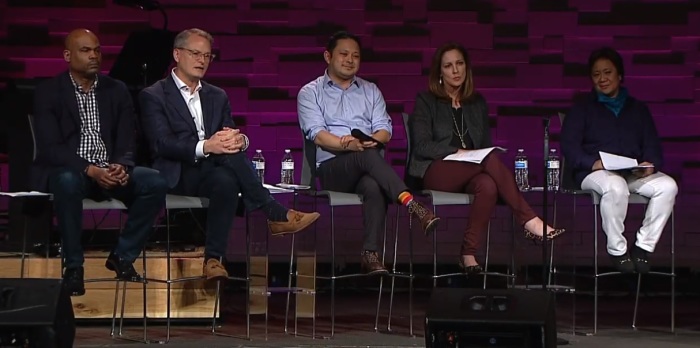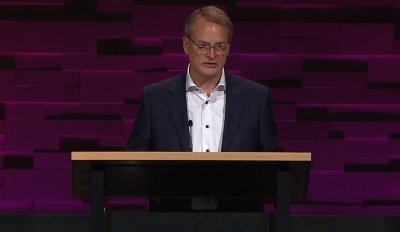Liberal UMC leaders promise ‘wide variety of resistance tactics’ against Church position on LGBT issues

Theologically progressive United Methodist Church clergy and activists have promised a “wide variety of resistance tactics” against the denomination's official opposition to homosexuality and gay marriage.
Church of the Resurrection of Leawood, Kansas, the largest UMC congregation in the United States, hosted a gathering of about 600 pro-LGBT United Methodists called “UMC Next” this week.
At issue was the recent reaffirmation of the UMC Book of Discipline’s position that homosexuality is “incompatible with Christian teaching” and barred same-sex marriages as well as the ordination of noncelibate homosexuals known as the “Traditional Plan.”
During a press conference held Wednesday on the final day of UMC Next, Ginger E. Gaines-Cirelli, senior pastor of Foundry United Methodist Church of Washington, D.C., told those gathered that there would be a “wide variety of resistance tactics” to the Church’s official position.
“For some of us, resisting the Traditional Plan means violating the Book of Discipline. For some persons in their context, it might not,” said Gaines-Cirelli.
“There will need to be a wide variety of resistance tactics all leaning into and seeking to help accomplish the commitments that we have made together here.”
Gaines-Cirelli added that “others will risk other kinds of things, but not for a variety of reasons be able or willing at this time to break the rules of the Plan, of the Discipline.”
Junius Dotson, general secretary of the UMC Discipleship Ministries, then commented that there are “many forms of resistance and people have to decide how they will participate.”
“What people should hear is that as this movement grows and as people are joining this movement, there are going to be different, varying levels of resistance depending on where people are,” Dotson said.
Mark Tooley, president of the theologically conservative Institute on Religion & Democracy and himself a United Methodist, told The Christian Post that he viewed the UMC Next event as evidence that pro-LGBT churches were planning to leave.
“This group has essentially formed the embryo of a new denomination and possibly more than one new denomination. They want a ‘new’ Methodism that is distinct from the current global church with its orthodox teaching, of which they are ‘ashamed,’” said Tooley.
“They are calling for resistance and political action within denomination while also acknowledging some will leave earlier than others to form their new entities.”
Tooley also told CP that he believed those at the press conference “tacitly admit they have lost at the general church level” and that the departure of liberal UMC members and churches “will unfold incrementally, depending on local context.”

Adam Hamilton, lead pastor of the Church of the Resurrection, who has long advocated for the UMC to remove its official position against homosexuality, explained in a YouTube video posted Wednesday that during the second day of the UMC Next event, they took a “preliminary vote” and found that attendees were “divided” over whether to leave the denomination.
“The division was between those who said ‘we’re ready to dissolve the UMC and form the next new thing. So we want to reform by taking people out of the church and starting something new. And there were those who said ‘no, we want to reform from within,’” said Hamilton.
John Lomperis, a General Conference delegate and member of the IRD, told CP that resistance calls should be “recognized as an unnecessary choice to selfishly drag our denomination through further avoidable conflict, while arrogantly refusing to listen to Scripture, to the Holy Spirit who inspired Scripture, to the relevant writings of John Wesley, and to the communal discernment of United Methodists outside of their narrow ideological faction.”
“Such resistance is unlikely to achieve any more than these same activists were able to achieve in trying to push the 2019 General Conference to adopt their liberal plan,” added Lomperis.
In late February, at the special session of General Conference, a majority of delegates voted in favor of a proposal known as the “Traditional Plan.”
Approved by a vote of 438 to 384, the Traditional Plan upheld the UMC’s official opposition to homosexuality, gay marriage, and the ordination of noncelibate homosexuals, while also ensuring stricter enforcement of the rules.
Also, a petition was approved allowing for congregations who may oppose the UMC’s official position to leave the denomination with their property and assets intact.
Pastor Talbot Davis of Good Shepherd UMC of Charlotte, which averages about 2,000 worshippers every Sunday, told The Christian Post in an earlier interview that he supported the result.
“I am delighted that the Special General Conference of the United Methodist Church adopted the Traditional Plan as we believe in the beautiful picture of celibacy in singleness and faithfulness in heterosexual marriage that is woven throughout the pages of Scripture as well as church teaching for since its inception,” said Davis.
“We gladly join with our global brothers and sisters in teaching this truth with as much love and winsomeness as we can.”
In April, most of the Traditional Plan, as well as the petition allowing a more “gracious exit” for dissenting congregations, was upheld by the United Methodist Judicial Council.
While declaring some of the petitions within the Traditional Plan to be unconstitutional, Judicial Council Decision 1378 nevertheless upheld most of the petitions, including a few that mandated stricter enforcement of the UMC’s prohibitions on gay ordination and same-sex marriage ceremonies.
“These petitions are not so closely related that a change in one affects the others. The petitions held unconstitutional have no effect on the petitions declared constitutional,” read Decision 1378.
“The constitutional petitions are not dependent on the unconstitutional petitions and can survive without the unconstitutional petitions.”
A proponent of the defeated “One Church Plan,” which would have allowed regional bodies within the UMC to determine their own stance on LGBT issues, Hamilton openly talked of leaving the UMC following the special session.
“I think it would not be hard,” said Hamilton in an interview with The Kansas City Star that was published days after the special session ended.
“I think our folks here love the United Methodist Church … they love the kind of church we have created and so we could start a new United Methodist Church and thousands of churches would join us."





























